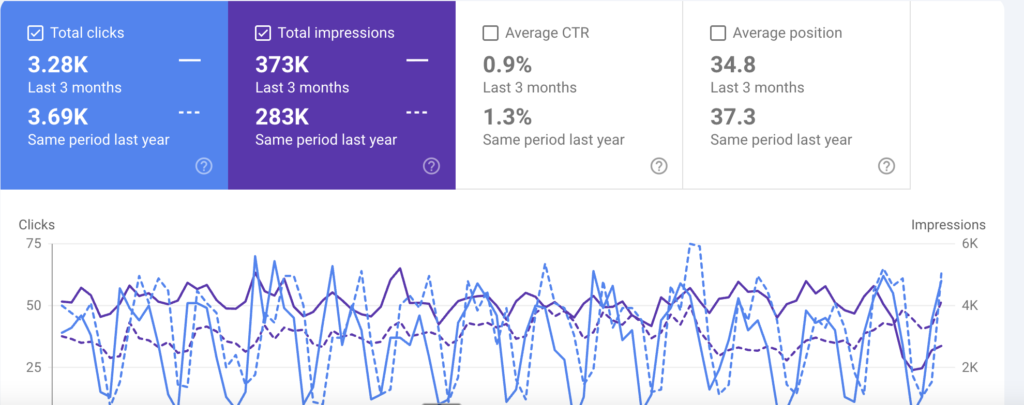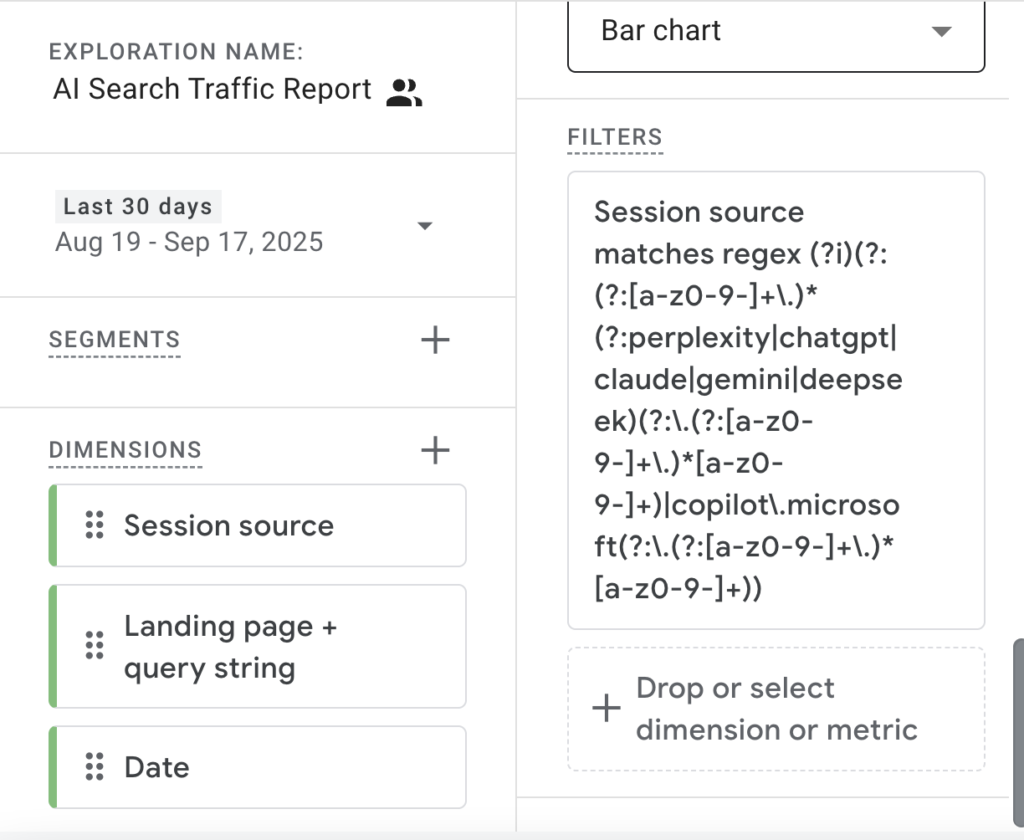After 20+ years in the marketing trenches, we’ve seen every “revolutionary” trend come and go. Most promised the world and delivered headaches.
AI is different — but not for the reasons everyone’s shouting about.
While marketers are busy creating AI-generated blog posts that sound like they were written by a robot mid identity crisis (with the em dashes to prove it), we’re having different conversations with our clients. Conversations about real impact, measurable shifts, and strategic adaptations that actually move the revenue needle.
Here’s what we’re telling clients right now about AI. No hype, just the tactical reality of what’s happening and what to do about it.
The Search Landscape is Fragmenting (And Your Traffic is Going with It)
Let’s start with the elephant in the room: traditional search is changing fast, and most businesses haven’t noticed their traffic bleeding away to AI platforms.
We’re tracking significant shifts in how people find information. Instead of clicking through to websites, users are getting answers directly from ChatGPT, Perplexity, Claude, and Google’s AI overviews. The result? Click-through rates are dropping as people get much of the info they’re looking for without actually visiting the site supplying that info.
The result? Simply looking at organic data from the SERPs (search engine results page) no longer tells the entire story.
What we’re seeing in client data:
- 15-25% decline in organic click-through rates for informational queries
- Users spending more time on AI platforms before ever reaching websites
- Traditional long-tail keyword traffic being absorbed by AI responses
This isn’t doom and gloom, It’s a strategic shift that requires adaptation, not panic.

^ Here’s a nice example of what we’re talking about.
This is year over year data (last 3 months 2025 vs. same period in 2024). Notice the decrease in clicks (-11.1% decrease) and contrast that with the pretty significant rise in impressions (+31.8% increase).
This isn’t a failure or a “sound the alarm” scenario. It’s a good example of what the industry is calling The Great Decoupling, and we wrote an entire blog about it here.
The New Search Reality: Optimize for AI and Humans
The old SEO playbook isn’t dead, but it’s incomplete. We’re now optimizing for both traditional search engines AND AI platforms that scrape and synthesize web content.
Here’s our current optimization strategy:
For Traditional SERPs:
- Featured snippets matter more than ever — they’re often what AI platforms reference
- Schema markup isn’t optional anymore; it’s how you communicate with both search engines and AI
- Long-form, comprehensive content that establishes topical authority
For AI Platform Visibility:
- Create content that’s easily quotable and attributable
- Use clear, definitive statements that AI can extract and cite
- Structure information hierarchically — AI loves organized data
- Include specific data points, statistics, and concrete examples
The businesses winning right now are those creating content that serves both audiences without compromise.
An example of our winning SEO-focused content strategies:

^ This data (pulled from Ahrefs) provides a neat snapshot of our content strategy. Looking at the last 6 months, we’ve helped this client increase their visibility on the following platforms:
Google AI Overview:
- Total citations: 576 (+404 increase)
- Pages cited: 81 (+54 new pages)
- Growth rate: +235% citations, +200% page coverage
ChatGPT:
- Total citations: 39 (+39 increase)
- Pages cited: 37 (+37 new pages)
- Growth rate: New presence (100% growth from zero baseline)
Perplexity:
- Total citations: 186 (+186 increase)
- Pages cited: 45 (+45 new pages)
- Growth rate: New presence (100% growth from zero baseline)
Gemini:
- Total citations: 403 (+403 increase)
- Pages cited: 287 (+287 new pages)
- Growth rate: New presence (100% growth from zero baseline)
Copilot:
- Total citations: 59 (+59 increase)
- Pages cited: 22 (+22 new pages)
- Growth rate: New presence (100% growth from zero baseline)
Key Insights:
Total AI Citations: 1,263 across 472 unique pages – this represents MASSIVE AI visibility growth.
Forum-Based Strategy: The Underutilized AI Traffic Driver
While everyone’s obsessing over ChatGPT, we’re seeing massive opportunities in forum-based platforms that AI systems reference heavily.
Reddit, Quora, industry-specific forums, and community platforms have become goldmines for businesses that understand how to participate authentically. AI systems frequently pull from these sources when providing answers, making forum participation a legitimate SEO strategy.
Our forum strategy framework:
- Identify where your IMPACT Prospects congregate online
- Industry subreddits
- Professional forums
- Q&A platforms in your space
- Provide genuine value, not sales pitches
- Answer specific questions with detailed, helpful responses
- Share case studies and real examples
- Link to your best resources when genuinely relevant
- Build authority through consistency
- Regular, valuable contributions over time
- Establish yourself as a go-to expert in your field
- Let your expertise speak before your products
The businesses getting this right are seeing their content referenced by AI platforms and building stronger community connections simultaneously.
Did you know? Reddit citations in ChatGPT responses have surged 87% since July 2025, now accounting for over 10% of all ChatGPT citations.
For more, check out our blog on how to use Reddit to grow your business’ visibility in AI platforms like ChatGPT.
Using AI Tools for Competitive Research and Strategy
Here’s where AI becomes your competitive advantage rather than your replacement: deep research and strategic analysis.
Perplexity for Market Intelligence: We’re using Perplexity to conduct competitive research that would have taken weeks before. It excels at synthesizing information across multiple sources and identifying patterns we might miss.
- Market trend analysis across multiple industries
- Competitive positioning research
- Customer pain point identification
- Industry-specific keyword opportunity discovery
Claude and ChatGPT for Strategic Thinking: These platforms excel at helping you think through complex strategic challenges when you feed them the right information.
- Scenario planning and strategic alternatives
- Customer journey mapping
- Content ideation based on specific audience segments
- Campaign optimization recommendations
The key: AI is your research assistant, not your strategist. It helps you process information faster, but the strategic thinking still needs to come from experienced humans who understand your business and market. We leverage AI to make us better (and you can too).
At 5K, we don’t just “do AI”, we live and breathe “IA” (intelligent automation). When you partner with us, you partner with a team of passionate business growth experts who (1) understand the ins and outs of digital marketing, and (2) understand what it takes to help your business thrive in the age of AI.
Best Practices for AI Integration (Without Losing Your Soul)
The businesses succeeding with AI aren’t replacing human expertise, they’re amplifying it. Here’s how we’re advising clients to integrate AI tools without losing what makes them unique.
Content Creation:
- Use AI for research and initial drafts, but always add your unique perspective and be sure to fact check
- Let AI handle the heavy lifting on data analysis and trend identification
- Human expertise should guide strategy; AI should speed up execution
- Never publish AI-generated content without significant human review and enhancement
Customer Service:
- AI handles initial inquiries and frequently asked questions
- Complex issues still require human intervention
- Use AI to route customers to the right human expert faster
- Train AI systems on your specific brand voice and values
Data Analysis:
- AI excels at pattern recognition in large datasets
- Use it to identify opportunities you might overlook
- Let AI handle routine reporting so humans can focus on strategic insights
- Always verify AI analysis with human expertise before making major decisions
The Attribution Challenge: Tracking AI-Influenced Conversions
Traditional attribution models are breaking down as customer journeys become more complex. Users might discover you through an AI platform, research on multiple channels, and convert weeks later.
What we’re tracking now:
- Brand search volume increases (often indicates AI-platform discovery)
- Direct traffic spikes following content publication
- Engagement patterns on multiple touchpoints
- Long-term customer value rather than first-touch attribution
The businesses adapting fastest are those focusing on overall brand strength and multi-touch attribution rather than trying to track every single interaction.
But we don’t stop there. We’re actually tracking traffic coming to our client’s sites FROM AI platforms through custom reports.
AI Search Traffic Report (GA4)

You might be asking yourself: what am I even looking at?
This screenshot is a Google Analytics 4 setup tracking direct AI platform traffic using a regex filter to capture visits from major AI search engines and chatbots.
The Regex Breakdown:
The filter (?i)(?:(?:[a-z0-9-]+\.)*(?:perplexity|chatgpt|claude|gemini|deepseek)(?:\.(?:[a-z0-9-]+\.)*[a-z0-9-]+)|copilot\.microsoft(?:\.(?:[a-z0-9-]+\.)*[a-z0-9-]+)) is capturing:
Tracked AI Platforms:
- Perplexity (perplexity.ai)
- ChatGPT (chat.openai.com)
- Claude (claude.ai)
- Gemini (gemini.google.com)
- DeepSeek (deepseek.com)
- Microsoft Copilot (copilot.microsoft.com)
What This Reveals:
- Traffic Attribution: This tracks users who click directly from AI platform responses to your site – different from the citations data we showed earlier. This measures actual traffic conversion from AI visibility.
- User Journey Mapping: This lets us see which AI platforms drive the most engaged traffic for our clients, not just citations. This helps identify which platforms provide higher-quality referral traffic, and if a site is actually getting traffic from the tracked AI platforms.
- Performance Segmentation: The dimensions allow you to analyze:
- Which landing pages perform best from AI traffic
- Temporal trends in AI-driven visits
Strategic Value:
This is advanced Answer Engine Optimization (AEO) measurement — we’re tracking the full funnel from AI citations to actual website visitors and conversions. Most sites only track traditional search; with 5K, you’re ahead of the curve measuring AI-driven traffic patterns.
Content Strategy in the AI Age
Content remains king, but the kingdom has new rules. We’re advising clients to create content that serves both human readers and AI platforms.
The new content hierarchy:
- Authoritative hub content – Comprehensive resources that establish topical expertise
- AI-quotable insights – Specific, valuable information that’s easy for AI to extract and attribute
- Community-focused content – Material designed for forum discussions and social sharing
- Interactive content – Tools, calculators, and resources that can’t be replicated by AI
The goal isn’t to compete with AI-generated content but to create value that AI can amplify and attribute back to your business.
Preparing for What’s Coming Next
Based on current trends and client data, here’s what we’re preparing for:
- Voice and Conversational Search Growth: AI platforms are becoming more conversational, and voice search is evolving rapidly. We’re optimizing content for natural language queries (NLP style keywords) and conversational patterns.
- Platform Diversification: Relying solely on Google is riskier than ever. We’re building presence across multiple platforms (social media, forums, AI platforms, and emerging search technologies).
- First-Party Data Importance: As attribution becomes more complex, businesses with strong first-party data collection and customer relationships have significant advantages.
The Bottom Line: AI is a Tool, Not a Strategy
Here’s what we keep telling clients: AI doesn’t replace good strategy, experienced execution, or genuine customer relationships. It’s a powerful tool that makes smart marketers more effective and amplifies existing strengths.
The businesses thriving right now are those using AI to enhance their human expertise, not replace it. They’re adapting to new search behaviors while maintaining focus on what’s always mattered: providing genuine value to their target customers.
If you’re feeling overwhelmed by AI changes, remember this: every major shift in digital marketing has created winners and losers. The winners are always those who adapt strategically rather than reactively, who focus on their customers rather than the latest shiny object, and who use new tools to amplify their existing strengths.
AI is just the latest (and maybe greatest) tool in the marketing toolkit. Use it wisely, but never let it replace the strategic thinking and customer focus that actually drive business growth.
Ready to develop an AI-integrated growth strategy that actually moves the needle? We’d love to show you how businesses in your industry are using these shifts to their advantage. Let’s talk strategy, not hype.









